

2645. GEM 2012 Global Report. Nearly Half of the World’s Entrepreneurs Are Between The Ages Of 25-44 According To Global Entrepreneurship Report The Global Entrepreneurship Monitor (GEM) 2012 Global Report estimates that nearly half of the world’s entrepreneurs are between the ages of 25 and 44.
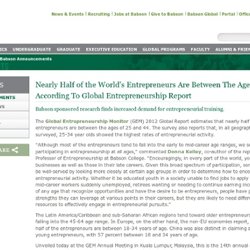
The survey also reports that, in all geographic regions surveyed, 25-34 year olds showed the highest rates of entrepreneurial activity. "Although most of the entrepreneurs tend to fall into the early to mid-career age ranges, we see people participating in entrepreneurship at all ages," commented Donna Kelley , co-author of the report and Associate Professor of Entrepreneurship at Babson College.
"Encouragingly, in every part of the world, youth are starting businesses as well as those in their late careers. Given this broad spectrum of participation, some economies may be well-served by looking more closely at certain age groups in order to determine how to encourage and support entrepreneurial activity. How Europe can find its feet again. In recent surveys on both sides of the Atlantic, top business executives gave a similar forecast: Europe and the United States are both losing their competitive edge.
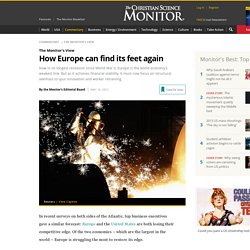
Of the two economies – which are the largest in the world – Europe is struggling the most to restore its edge. It’s a struggle the rest of the world cannot ignore. The Continent is dealing with its longest recession since World War II. Many of its major economies are shrinking, even France. Germany, despite past reforms, had only 0.1 percent growth last quarter, revealing just how much it relies on its neighbors. The European economy still commands a fifth of the global economy, but it is now its weakest link. While European leaders have been able to stabilize financial markets and start to whittle down government deficits, the hard work of structural reform is still in progress. A refocus on Europe’s inherent strengths, such as design and engineering, are key. Small companies create 85% of new jobs. 85% of net new jobs (1) in the EU between 2002 and 2010 were created by small and medium sized enterprises (SMEs).
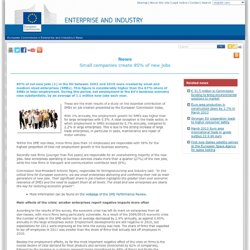
This figure is considerably higher than the 67%-share of SMEs in total employment. During this period, net employment in the EU's business economy rose substantially, by an average of 1.1 million new jobs each year. These are the main results of a study on the essential contribution of SMEs on job creation presented by the European Commission today. With 1% annually, the employment growth for SMEs was higher than for large enterprises with 0.5%. A clear exception is the trade sector, in which employment in SMEs increased by 0.7% annually, compared to 2.2% in large enterprises. European Family Businesses. Business planet, how do small and medium-sized companies get access to finance? We speak to entrepreneurs who have succeeded and find out how they did it.
Fact and figures about the EU´s Small and Medium Enterprise (SME) - Small and medium sized enterprises (SME) - Enterprise and Industry. Small and medium sized enterprises (SME) - Enterprise and Industry. The European Commission works on broad policy issues affecting entrepreneurship and SMEs across Europe, and assists SMEs through networks and business support measures.
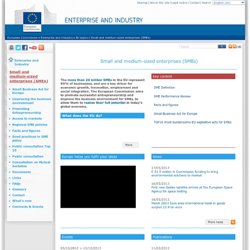
It helps existing and potential entrepreneurs to grow their businesses, giving special attention to women entrepreneurs, crafts and social economy enterprises. European Commission - Putting Small Businesses First. Europe is good for SMEs, SMEs are good for Europe - sme_pack_en_2008_full_en.pdf. Europe's 100 hottest startups 2012. Israelis call the sprawl of high-tech industries spreading out from the centre of Tel Aviv "Silicon Wadi" -- and depending who you talk to, this could be the second-largest startup centre outside California.

Since 1993, young people coming out of military high-tech units with business ideas found support from the Yozma programme, a government-sponsored fund of funds. There's also a steady influx of educated immigrants, especially from eastern Europe. Gvahim Entrepreneurs recently launched The Hive to partner new arrivals with Israeli mentors. Saul Klein, until recently a Tel Aviv-based investor working for Index Ventures, tips Rothschild Boulevard -- home to the likes of face.com and Soluto -- as the place to watch. Wired European Startups. European Startups Battle Labor Laws for Best Talent. Berlin has become a startup hub, but needs the developers and programmers to power that growth.
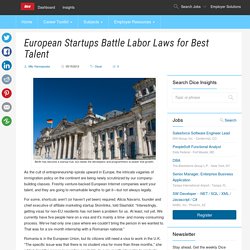
As the cult of entrepreneurship spirals upward in Europe, the intricate vagaries of immigration policy on the continent are being newly scrutinized by our company-building classes. Freshly venture-backed European Internet companies want your talent, and they are going to remarkable lengths to get it—but not always legally. For some, shortcuts aren’t (or haven’t yet been) required: Alicia Navarro, founder and chief executive of affiliate marketing startup Skimlinks, told Slashdot: “Interestingly, getting visas for non-EU residents has not been a problem for us.
At least, not yet. We currently have five people here on a visa and it’s mainly a time- and money-consuming process. Romania is in the European Union, but its citizens still need a visa to work in the U.K. The short answer: they can’t. This entrepreneur added: “At immigration she was pulled up and asked what she was doing in the UK.